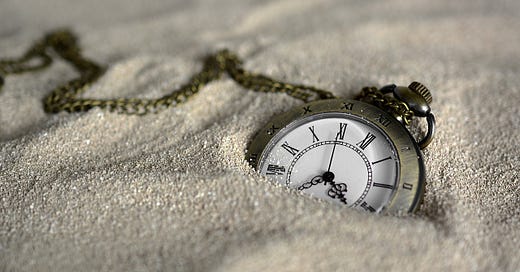Happy New Year! We are nearing the end of the year 2022!
But…
Ok. Yes, brace yourself. I’m going to be that person in the New Year's zoom party who says:
Well, actually…December 31, 2022 is a construct. The idea of this ‘year’ turning into the next ‘year’ on this specific date is a thing that certain humans have socially defined.
A select group of powerful Europeans in the ‘so called’ 1500s made up the modern calendar. They had their reasons, but still: they made it up! They intentionally decided to shape Time this way.
And it took a while for their view to ‘take’ around the world. Like a lot of modern things, it became more dominant via the enforcement of colonialism.
And this calendar didn’t harden everywhere all at once! Some places went faster than others.
Isn’t that something?!
Our ‘calendar’ seems like a rock solid backdrop to our modern lives, totally unshakable, but there was (is) a time when the human sense of Time was (is) less cohesive, more nuanced, multiple, and different.
Some might call this progress.
But “progress”, when you really sit down and think about it, is another shifting, socially derived foundation that lurches and reshapes itself and has vagaries depending on who and where and when. (And, like the calendar, is often enforced by whoever has the power to decide its dominant definition.)
But back to our upcoming New Year’s Eve Celebration!
Our modern calendar says that 2022 is about to turn into 2023 and also, simultaneously, we ‘know’ that humans have been on this planet for around 200,000 to 300,000 years.
Give or take. (The definition of ‘human history’ also shifts and lurches around.)
But we’re just playing here! So let’s split the difference and say humans have been around 250,000ish years.
So we could also say, in play, that we humans are approaching the year 250,001ish.
Happy New Year 250,001ish!
If we turn our New Years into the realm of the hundreds of thousands, what else might change for us?
Well, we’re gonna need a bigger banner for our New Year’s Eve party, obviously!
And also, we might wonder: shifting into this wider time frame, do we find it easier to look forward with broader time spans? Can we, perhaps, more readily make decisions we know will carry us well into the next 1000 years?
And if we measure time less precisely with “-ish”, how does that impact ‘a day’? Can we still define a ‘work day’? What does work even mean in this kind of nebulous time context? Or ‘time management’?
What even is a clock? What is it needed for?
Suddenly, with one tiny shift in how we decide to view ‘the calendar’, so much ripples out into fractals of other possibility.
What seemed to solidify ‘modern life’ cracks and shimmers with potentials.
Thinking of ourselves in longer timeframes, we might also more easily put on the eyes of Geological Time or Tree Time or Geese Time, which in turn might alter how some modern humans view and interact with land and trees…and geese. (Are we mindful of their migratory needs? How much are we paying attention to their time cycles?)
Maybe more of us ‘mono-time’ folks might even become more ‘time fluent’ shifting in and out of other time modalities?
That seems to have happened already with Plastic Time.
When I was a kid in the so-called ‘1980s’, I wore neon plastic brackets that I now realize are still alive in a dump somewhere and will live longer than me.
Their plastic timeline was not a wide priority for my white, working class(ish) family back then. But it’s becoming more so now.
Priorities, like perspectives, shift.
Many of us modern folks are often made to forget, and have to intentionally remember, that what was made dominant by certain humans—like the modern calendar—was (is) a decision. It is changeable, malleable — and it coexists within ripening multiplicities.
There are other ways of relating to each other and to our earthly context that can be seen and felt and held right now.
There are other ways to be ‘here’ together.
So whatever ‘year’ this is, whatever turning time(s), I’ll raise my glass to the Potency of Possibility.
May our remembrance of these Deeper Possibilities become a wider community habit.
Cheers!





